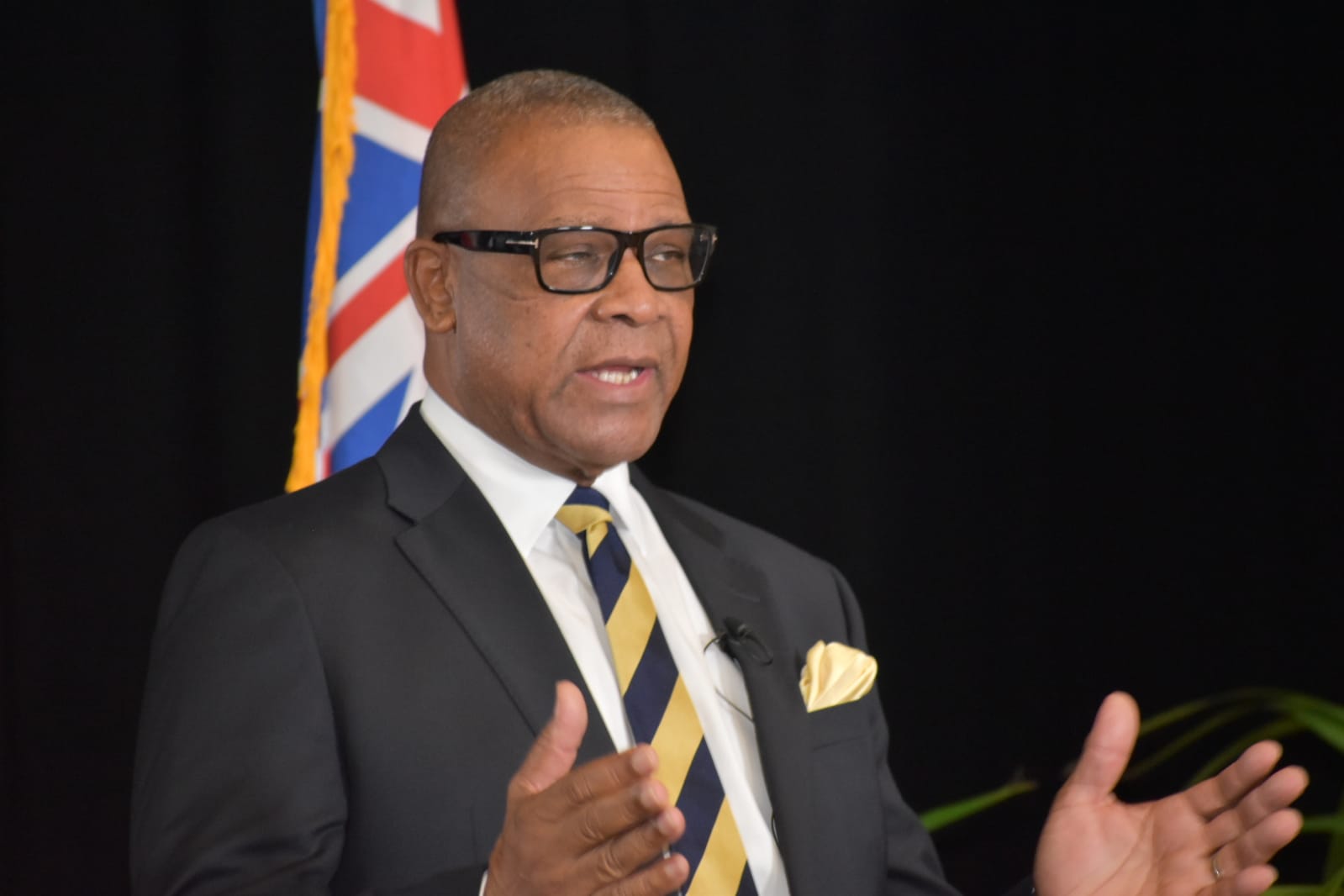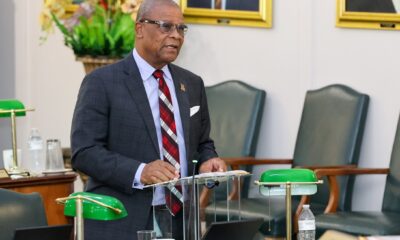News
What the Premier said as PNP Administration Marked One Year in Office
Published
4 years agoon

By Dana Malcolm & Deandrea Hamilton
#TurksandCaicos, February 23, 2022 – A year has passed since the PNP Administration took office in a landslide victory. Led by Washington Misick, the administration has been faced with several challenges including an ongoing Covid-19 pandemic and rising inflation.
On Thursday Premier Washington Misick sought to assuage the fears of islanders regarding the transparency of his administration and provide insight into the 2022/2023 financial year.
Misick addressed several areas including security, education, social support, e-government, housing and finance.
UNLIMITED SAVINGS ON LAND TAX FOR NATIVES
The Premier started out with an announcement of an up to $50,000 duty concession on building materials for construction and home improvement. This received applause from the audience at the Brayton Hall where the national statement was being televised live.
Tax on land purchases by TCIs and British Overseas Territory Citizens, (BOTCs) are to receive a major discount.
“We are reducing stamp duties on land purchase by Turks and Caicos Island status holders and British overseas citizens by between 40 and 50 per cent.”
citizens by between 40 and 50 per cent.”
For Turks and Caicos status holders the purchase of multiple properties will be covered by the reduction and BOTCs can purchase one property under this reduction.
STIMULUS TO STUDENTS, EDUCATION SECTOR EXPANDING
Misick touched on education revealing that the Pan American Health Organization, (PAHO) has approved the Turks and Caicos to begin nursing practice by June.
The 10 nurses who had received their Associates Degrees but could not move on because they did not have provisions for nursing practice will now be able to continue their journey, and will start internships at the InterHealth Canada run hospitals by April.
This is only one of several other upgrades across all levels for the education sector and Premier Misick revealed programs to target special needs programs, an increase in scholarships, and in line with what youth in the country expressed in the national youth policy, more TVET courses will be offered.
A construction and hospitality institute are coming, said the Premier in the State of the State Address.
Stimulus for students is also budgeted in the new fiscal plan for 2022-2023; $212,000 is earmarked for students who are out of school and there is a $150,000 allocation for Special Needs students in that same category.
WAGE COMMISSION ACTIVATED, CONSUMER COURT COMING
The Premier acknowledged the growing agitation and revealed a re-assessment of the minimum wage; that a Minimum Wage Committee has been staffed and is ready to go.
The Committee will comprise government workers including the Permanent Secretary of Labor, who will chair the committee; the Deputy Permanent Secretary of Finance; a representative from the Statistics Department, one from the Premier’s office and one from the Department of Labor.
Members of the Attorney General’s chambers and two private sector members will also be a part of the committee which will meet to advise the government on what constitutes a “socially just wage.”
The government though says that ‘just wage’ figure will be arrived at when combined with social support programs. The committee officially started their duties on Monday (February 21) and will run for three months.
Turks and Caicos Islanders are also set to benefit from a Consumer Protection Tribunal.
“The initiative is part of the government’s push to build infrastructure to begin to monitor business and trade practices and for unfair behavior,” Misick said.
The new Consumer Protection Tribunal will be a space where individuals can report unfair practices and get the issues addressed.
Misick did not say exactly when the Tribunal would be ready to receive consumer complaint reports.
NATIONAL SECURITY’S RUNNING TAB
In terms of border and citizen security, millions of dollars have been allocated, totaling 12 per cent of the budget, said the nation’s chief during the presentation made just days ahead of his one year in office anniversary, which was February 19.
In the works a new remand centre, the shocking news is that it is set to be established in Providenciales.
Premier Misick said land had been purchased to build the remand center. Construction is also planned for the TCI Regiment’s barracks and a training academy at a cost of $1.8 million with $2 million respectively.
A cumulative spend of $15 million was announced for Border Security. Benefiting from the multi-million dollar security package will be the TCI Regiment, the Royal TCI Police and the Radar system.
The premier seems ready to launch a partnership, which he hopes will work in curbing crime. There was an appeal to the Church, youth groups, schools and parents.
“We believe the solutions begin in our homes. It starts with parents keeping their children out of harm’s way. We must keep more of our young people out of trouble with prevention strategies developed in conjunction with our communities,” he said.
BEAUTIFUL BY NATURE, EVERYWHERE
The Premier also committed financial assistance to repairing roads and electrification so that the Police could better access areas across the islands.
Add to this security solution, there is a move to clean up areas beyond award-winning Grace Bay.
“No more slum landlords please” was in a final string of appeals from Premier Washington Misick who said trash, indiscriminate dumping and poorly maintained private properties will soon no longer be off limits.
Under the National Physical Development Plan, (NPDP) which came to force this past October, the PNP Administration is now prepare to exercise its muscle to eradicate the high level of filth in communities which lie outside of the tourism district.
It was also apparent, that TCIG wants to ensure buildings are more resilient. The increase and severity of storm systems around the world place an onus on Government’s to shore up construction to reduce losses and destruction.
The NPDP is aimed at enforcing sturdier construction.
“This plan supports effective and efficient development and supports sustainable land use. We are applying strict protocols for large scale projects. Settlements which ignore planning laws and litter the landscape with dwellings that are unsafe will be stopped. And I speak to TCI Islanders who are acting as slum landlords asking you not to engage in that practice.”
OWNING A HOME, AT HOME
Young professionals, single mothers, multigenerational families and the elderly can look forward to accessing new housing options from the government in the future.
The Premier announced that housing solutions have been earmarked for these specific groups, adding: “The new housing policy will ensure equitable distribution of purpose-built and sustainable housing solutions in the Turks and Caicos.”
The news signals the return of a dedicated housing department for the Turks and Caicos within the ministry of Physical Planning and Infrastructure Development. A survey is currently being conducted to qualify and quantify the needs and expectations of the general public.
FUNDING TRIPLED FOR E-GOVERNMENT
It was also announced that the financial allocation for E-government has tripled this upcoming budget year from $2 million to $6 million.
The mammoth task of going fully digital is set to cost the government around $60 million dollars in the long run and will take years to be fully completed. However, the Washington Misick-led government administration will accelerate the transition to e-government this year and explained some completed e-governance upgrades which Turks and Caicos residents can now access.
“Business license applications can be done online… now you have a business license in 48 to 72 hours and 80 per cent of services offered by the Immigration department can be accessed online.”
Throughout the speech, which lasted just over an hour, Premier Washington Misick insisted that Turks and Caicos Islanders would get their money back; a phrase he used to assure the nation that it will begin to tangibly experience the benefits of successively stellar economic seasons for the Turks and Caicos Islands.
You may like
-


2,846 Jobs in the Pipeline; TCI with $430 Million Cash
-


Premier Washington Misick to UK: “If You Can’t Manage National Security—Turn It Over to Us”
-


A Nation Under Siege: Premier Demands UK Action After Deadliest Mass Shooting in TCI History
-


Premier Misick Sets the Tone for Justice Reform in Turks and Caicos
-


Premier Misick and Ministers ‘adamantly opposed’ 49 grants – Governor’s approval sparks outrage
-


Premier Misick Marks Government’s First 100 Days with Key Initiatives and Community Engagement
News
Commonsense, Not Confrontation: Why Kamla Persad-Bissessar Is Right
Published
3 weeks agoon
December 27, 2025
This debate did not start with Donald Trump, and it did not start this month.
For more than a decade, this reporter has had a front-row seat to repeated, urgent calls from across the Caribbean for stronger intervention by the United States in response to gun- and narcotics-fuelled violence that has hollowed out our communities. Long before today’s headlines, leaders warned that transnational gangs were outgunning police, draining public resources and stealing our youngest people.
Much of the public messaging leaned toward calls for fewer guns flowing from the United States, but the practical response from Washington evolved into something else: tactical undergirding of the Caribbean. Training, intelligence sharing, maritime surveillance and joint operations expanded under successive U.S. administrations — Republican and Democrat alike.
Then came Venezuela.
President Nicolás Maduro proved himself an unhinged and destabilising force, openly threatening Guyana’s oil-rich territory and pushing the region to the brink of a conflict no Caribbean state could afford. The United States showed up. The threat of war was blunted. That mattered.
But while geopolitical flames were contained, the narcotics trade exploded.
CARICOM convened emergency meetings on transnational gang violence. Crime became so pervasive that it was formally classified as a public health threat. Entire communities were terrorised. Courts clogged. Police forces stretched beyond capacity.
And now — quietly but noticeably — the tempo has shifted.
While no single forensic study can capture the full picture, it is easily verifiable on the ground that major narcotics busts and trafficking activity have slowed in recent months. Something has changed. Pressure works.
This is the reality Prime Minister Kamla Persad-Bissessar is responding to.
Her critics accuse her of breaking ranks. What she is actually doing is refusing to indulge in strategic hypocrisy — demanding international help to confront narco-terrorism while appearing to defend or excuse the very networks and actors we have spent years condemning.
Sovereignty is not an insult. The Caribbean invokes it constantly. To deny it to the United States — especially when the policies in question were telegraphed months in advance and remain adjustable — is not diplomacy. It is posturing.
What is most troubling is the region’s selective memory. CARICOM has directed months of rhetorical fire at Trump-era policies, yet when disaster struck — from security crises to Hurricane Melissa — the United States remained one of the region’s most reliable supporters. Outcomes matter more than allegiance theatre.
Kamla Persad-Bissessar is not suffering from Trump Derangement Syndrome. She is applying commonsense statecraft. She understands that small states do not gain leverage by moral outrage alone, and that credibility is lost when we appear aligned with individuals, regimes or activities we ourselves have deemed a threat.
Her warning to CARICOM is simple and necessary: do not undermine your own cause.
The Caribbean’s fight against narco-violence, corruption and instability has been long, costly and painful. If pressure is finally producing results, we should be wise enough to recognise it — and brave enough to say so.
Angle by Deandrea Hamilton. Built with ChatGPT (AI). Magnetic Media — CAPTURING LIFE.
News
Beaches Turks and Caicos Showcases and Supports Local Creativity
Published
4 months agoon
September 12, 2025
September 12, 2025
PROVIDENCIALES, Turks & Caicos Islands – The Turks and Caicos Islands are home to a wealth of creativity, from artisans and craft vendors to musicians and performers. Beaches Turks and Caicos, the Caribbean’s leading all-inclusive family resort, has pledged its continued support for these individuals by providing meaningful platforms for them to share their skills and stories with guests from around the world.
The resort’s commitment is most evident in its weekly Cultural Night showcase, where visitors are immersed in the vibrant traditions of the islands. Guests enjoy live performances which feature local music genres such as ripsaw, while artisans display and sell handmade creations. This event not only enriches the guest experience but also strengthens economic opportunities for local entrepreneurs.
Entertainment Division Manager Garett Bailey emphasized the significance of Cultural Night, “we want to showcase everything the Turks and Caicos Islands culture has to offer. Our goal is for guests to leave with a deeper appreciation of the island’s art, music and traditions, while giving local talent the opportunity to share their creativity with visitors from across the globe.”
Beyond Cultural Night, Beaches Turks and Caicos also welcomes local craft vendors onto the resort every Wednesday and Friday where they are offered a direct space to market their goods. Guests have easy access to the Turks and Caicos Cultural Marketplace, where they can purchase authentic local arts and crafts.
where they are offered a direct space to market their goods. Guests have easy access to the Turks and Caicos Cultural Marketplace, where they can purchase authentic local arts and crafts.
Managing Director, James McAnally, highlighted how these initiatives reflect the resort’s broader mission, “we are committed to celebrating and sharing the vibrant culture of these islands with our guests. By showcasing local artistry and music, we not only provide entertainment but also help sustain and grow the creative industries of the Turks and Caicos Islands. From our cultural showcases to nightly live music, we are proud to create authentic connections between our guests and the people of these islands.”
Local musician Keon Hall, who frequently performs at the resort, expressed gratitude for the ongoing partnership, “being able to share my music with Beaches’ guests has created lasting relationships. Some visitors return year after year and request songs from previous performances. This partnership continues to celebrate what we do and strengthens the bond between local artists and the resort.”
The resort’s support of local artisans and entertainers extends beyond business opportunity; it is about preserving heritage and sharing stories. Guests take home more than souvenirs; they leave with experiences that deepen their understanding of Turks and Caicos’ culture and history.
Public Relations Manager, Orville Morgan, noted the importance of this commitment, “for many visitors, these interactions represent their first genuine connection to the Turks and Caicos Islands. From artisans and musicians to farmers and transport operators, our local talent helps shape every guest experience. At Beaches, we are proud to give them the stage to share their stories and their heritage.”
Beaches Turks & Caicos remains dedicated to developing cultural connections and supporting the artisans, musicians and entrepreneurs whose creativity makes the Turks and Caicos Islands unique. Each guest experience is an opportunity to celebrate and sustain the spirit of the islands.
Caribbean News
“Barbecue” is Cooked! US Turns Over 11 Million Haitians into Potential Informants with $5 Million Bounty
Published
5 months agoon
August 12, 2025
August 12, 2025
The United States just set fire to the underworld in Haiti — and this time, the smoke might finally flush out the man many call the most feared in the Caribbean.
On Tuesday, the U.S. government slapped a $5 million bounty on the head of Jimmy “Barbecue” Chérizier, the ex-police officer turned gang boss accused of orchestrating massacres, torching neighborhoods, and strangling Haiti’s capital into chaos. This isn’t just a headline — it’s a full-blown game-changer.
turned gang boss accused of orchestrating massacres, torching neighborhoods, and strangling Haiti’s capital into chaos. This isn’t just a headline — it’s a full-blown game-changer.
That kind of cash — offered under the State Department’s Transnational Organized Crime Rewards Program — is enough to turn the country’s entire population, more than 11 million people, into potential informants overnight. Add the millions in the Haitian diaspora, and Chérizier isn’t just wanted. He’s surrounded.
The Number That Changes Everything
Five million U.S. dollars today equals about 655 million Haitian Gourdes. In a country where many scrape by on less than $5 a day, that’s not just life-changing — it’s life-defining. It’s enough to rebuild homes, put generations through school, or buy a one-way ticket far from the gunfire.
In a place where trust is scarce and survival is everything, that figure is more than tempting — it’s irresistible. For Chérizier, it means every friend could be a future informant, and every loyalist might be calculating the cost of staying loyal.
‘We Will Find Them’ — Jeanine Pirro, U.S. Attorney
Jeanine “Judge Jeanine” Pirro, the U.S. Attorney, set the tone with fire in her voice. “This indictment is the first of its kind,” she announced. “Jimmy Chérizier, also known as ‘Barbecue,’ is a notorious gang leader from Haiti who has orchestrated and committed various acts of violence against Haitians, including the 2018 La Saline attack in which approximately 71 people were killed. He both planned and participated in that massacre.
“Anyone who is giving money to ‘Barbecue’ cannot say, ‘I didn’t know.’ They will be prosecuted, and we will find them. They are supporting an individual who is committing human rights abuses, and we will not look the other way.”
Pirro wasn’t just going after Chérizier. She was sending a warning to the Haitian diaspora accused of feeding his war chest from abroad: the days of claiming ignorance are over.
‘No Safe Haven’ — Darren Cox, FBI
Then came Darren Cox, Deputy Assistant Director of the FBI, delivering the muscle of America’s most powerful investigative force. “There is no safe haven for Chérizier and his network,” Cox declared. “We are closing every link, every cell.” Since January, he said, the FBI has arrested three Top Ten fugitives, taken more than 19,000 criminals off the streets, and seized thousands of tons of narcotics — enough to save millions of lives across the U.S.
The FBI’s Miami and Houston offices have already bagged one of Chérizier’s Viv Ansanm associates inside the United States without firing a shot. “These efforts are a deliberate and coordinated plan,” Cox said, “to protect our communities and confront escalating threats from terrorist organizations like Viv Ansanm.”
‘Three-Year Investigation’ — Ivan Arvelo, HSI
Ivan Arvelo, Assistant Director of Homeland Security Investigations, brought the receipts. “This is the result of a three-year investigation into Chérizier’s procurement networks, cash pipelines, and operational financing that violates sanctions,” he explained. Arvelo described 400 structures destroyed, entire communities erased, and a gang exploiting U.S. dollars, technology, and immigration loopholes to keep its killing machine running. “We tracked how Americans unwittingly bankrolled brutality,” he said — proof that the net is tightening both inside Haiti and abroad.
‘The Worst of the Worst’ — Chris Lambert, State Department
Chris Lambert, representing the State Department’s International Affairs division, gave the political bottom line.
“Mass violence in Haiti must end,” Lambert said. “The instability resulting from Chérizier’s actions fuels illegal migration, regional instability, and transnational crime. We will continue to apply every tool available — including our rewards programs — to stop the spread of unchecked violence, especially to target the worst of the worst criminal leaders threatening the people of our hemisphere.”
instability, and transnational crime. We will continue to apply every tool available — including our rewards programs — to stop the spread of unchecked violence, especially to target the worst of the worst criminal leaders threatening the people of our hemisphere.”
Lambert confirmed what many have long known: Chérizier is not just a gang leader. He commands Viv Ansanm, officially designated in May as a Foreign Terrorist Organization. In the eyes of the U.S., that makes him not just Haiti’s problem — but everyone’s.
Why Haitians May Not Resist
In Haiti, money talks — loudly. And when you put 655 million Gourdes on the table, it shouts.
That’s the kind of figure that turns casual acquaintances into informants and makes even the most hardened loyalist wonder if the payout is worth more than the risk. It’s not a matter of “if” word gets out, it’s a matter of “who will be first to collect.”
For grieving families, it’s a chance at justice. For the desperate, it’s a chance at survival. For Haiti as a whole, it’s hope — wrapped in the most dangerous of temptations.
An Answer to Prayers
For years, Haiti’s headlines have been a scroll of horrors — kidnappings, executions, burned neighborhoods, bodies in the streets. Chérizier’s name has been attached to too many of them.
This move by the U.S. isn’t just strategy. It’s personal. It’s a signal to every Haitian — at home or abroad — that the days of impunity could be ending.
I’ll admit it: when I heard the news, I danced, I sang, and I nearly cried. Not because $5 million is a lot of money, but because of what it means — the possibility, at last, of stopping the man accused of helping turn Haiti into hell on earth.
Four officials, four angles, one mission: Pirro’s fire, Cox’s grit, Arvelo’s precision, Lambert’s conviction. Together, they’ve put the heat on “Barbecue” like never before.
BBQ is cooked. The only question now is: which one of over 11 million potential informants will serve him up?







